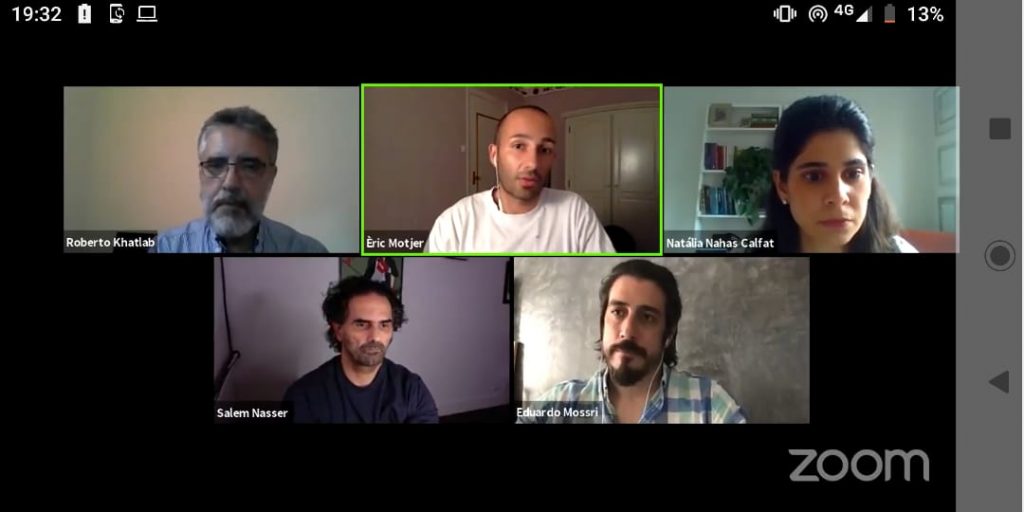São Paulo – For Eric Motjer (pictured below, center), the director of feature documentary Beirut – La Vie en Rose, the interviews with people from Lebanon’s high society give a glimpse into a different image of the country. “Whatever us younger people know about Lebanon, we learn from the media. As if bombs were falling every day, and that’s not the case. In a way, the film is provocative. It was important for me to toy around with viewers and try and get them into this bubble,” Motjer said during an online conversation hosted by the Arab World Film Festival at Home, whose program includes the film.
The conversation aired live this Friday (4). Besides Motjer, it featured Roberto Khatlab, the director of the Latin American Studies and Cultures Center at the Holy Spirit of Kaslik University (USEK), in Lebanon; professor Salem Hikmat Nasser, PhD in International Law from the University of São Paulo (USP) and a Law professor at Faculdade Getúlio Vargas; and Eduardo Mossri, who holds a baccalaureate degree in Acting from the USP School of Communication and Arts. Mossri is the producer and actor in theatrical play Cartas Libanesas. The moderator was Natália Nahas Carneiro Maia Calfat, a social cientist pursuing a degree in Political Science from USP.
Motjer’s film showcases the luxurious lifestyle of the elite amid the nationwide turmoil, featuring three people from the Christian upper class who seem to avert the reality that they’re in.
Mossri asked the director about the contradiction which the film and its title seem to expose. “What I found interesting about the characters is that they related to something that there’s less and less of in the country,” Motjer said. “I’m not sure I’d go so far as to say the elite is decadent, because they still have power, but I feel they’re not as powerful as they used to be. It’s true that it could have been a different elite community, but in this case I guess I [chose] the Christian elite for what it represented, from a cinematic and philosophical perspective,” the filmmaker explained.
He also said the documentary sets out to portray the reality of its interviewees. “We intend to tease viewers. It’s not a comfortable movie to watch. Because it prompts you to ask questions about Lebanon, and whether that reality is actually real,” said Motjer, a director, documentarist and producer trained at the University of Barcelona.
The full conversation is available on the YouTube channel of Instituto da Cultura Árabe (Icarabe), which is hosting the Festival.which is hosting the Festival. The 15th Arab World Film Festival is ongoing until September 21 featuring movies online. The show is hosted by Icarabe in partnership with SESC-São Paulo, sponsorship from the Arab Brazilian Chamber of Commerce, and support from Instituto do Sono and the Federation of Muslim Associations in Brazil (Fambras).
Quick facts
Arab World Film Festival at Home
August 28-September 13
Festival website
SESC website
Free of charge
Translated by Gabriel Pomerancblum




